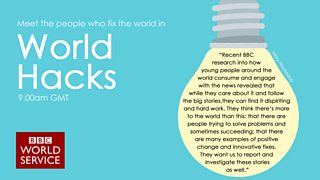World Hacks: Meet the people fixing the world
Mary Hockaday
Controller, 主播大秀 World Service English
Tagged with:

You don’t need to have worked in journalism as long as I have to know that the news gravitates towards the unusual and the dramatic. And that that news is often bad. From war and natural disasters to political unrest, it’s our job as journalists to report, expose, scrutinise and challenge; to lift the lid on problems and hold those in power to account. But, do you ever feel overwhelmed and powerless, are you ever left with the sense that things never get better – and switch off?
Some of our listeners do. audiences are avid consumers of news but they want more. Recent 主播大秀 research into how young people around the world consume and engage with the news revealed that, while they care about it and follow the big stories, they can find it dispiriting and hard work. They think there’s more to the world than this, that there are people trying to solve problems and sometimes succeeding and that there are many examples of positive change and innovative fixes. They want us to report and investigate these stories as well.
As , a young woman from Johannesburg, said to me on a phone-in with young global listeners, "I do think there needs to be some level of solutions-building - otherwise it’s just news for news’ sake."
The message was impossible to ignore. It came at a time when I was already interested in what’s known as 'solutions journalism'. Newsrooms in the US and Scandinavia have been experimenting with this approach, as has the constructive journalism project in the UK. Our primary responsibility is to provide accurate, impartial news and good information to audiences around the world. That will continue. But we’re adding to the mix a weekly programme which goes one stage further, outlining challenges and then talking to the people who are tackling them.
This weekend we’re launching a new weekly series called which brings a fresh perspective by tracking down and exploring ideas which have changed, improved or turned things around. Harnessing the global reach of 主播大秀 World Service, an international team of journalists will scrutinise ideas that are making a difference and, crucially, look at whether they can work elsewhere. Stories such as how people make water in Peru, deliver aid in Lebanon or train police in parts of the US to try and prevent fatal shootings. By focusing on solutions we can frame the news differently, make our journalism richer. Hard news has a tendency to treat people as victims. Hearing from agents of change reverses the telescope – and often makes for great, inspiring stories.
It‘s important to say that this is not 'soft' journalism or 'good news' reporting. We’re testing ideas that some people say have worked. We’re not buying uncritically into successes or endorsing a particular ideology about how problems should be solved. We’re looking for evidence and highlighting the limitations where we find them with the same rigour and scrutiny we use in all our reporting.
Nor is it the first time we’ve done it.
We used a solutions-focused journalism a year ago in , a wonderful six-part series presented by Fi Glover which teamed up with (IGP) and Martha Lane Fox to look at policies implemented in particular countries, examine them in depth and explore whether they could be used somewhere else. The series is returning in December, to continue building a blueprint for the perfect country. Water-saving roofs from Bermuda, anyone?
We’re not the only part of the 主播大秀 thinking about solutions-focused journalism. Teams across 主播大秀 News are experimenting with this approach and finding that these stories often do very well on digital and social platforms - those younger audiences we talked to meant it when they said they wanted this kind of reporting. But is the 主播大秀’s first weekly programme consistently taking this approach.
will also include digital strands including short video features, a digital space for people everywhere to share and discuss key issues and crowd-source clever solutions, alongside mini-talks by radical thinkers, all available on bbc.com/worldhacks and social media. So, could the people of traffic-congested Mumbai offer any urban survival ideas to the people of cities like Kampala which is now facing the same noise problem? Our global reach and capacity to connect people means the best ideas really can travel.
Mary Hockaday is Controller, 主播大秀 World Service English
- World Hacks starts on the 主播大秀 World Service, Saturday 19 November, at 9am GMT and will be available on bbc.co.uk/worldserviceradio
- Receive the latest updates on the
